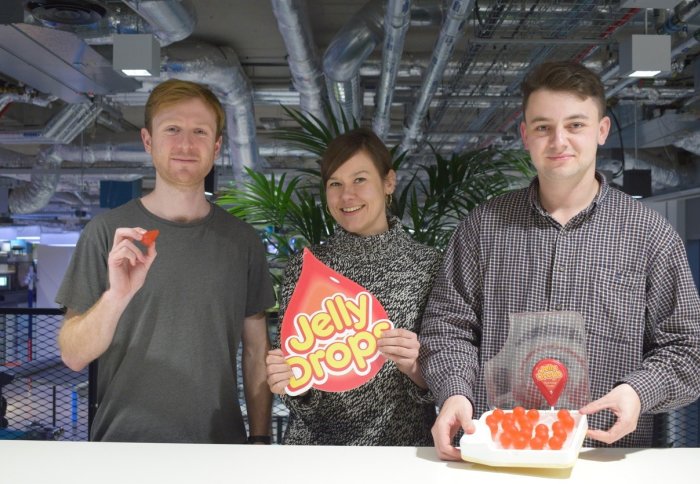Imperial start-up wins big at The Duke of York’s entrepreneurship competition

Jelly Drops, who have invented super-hydrating sweets, beat 41 other entrepreneurs to secure a double victory at St James’s Palace.
Jelly Drops, made up of graduates from the Dyson School of Design Engineering were announced as the overall winner at the competition’s final and also won the public vote, securing the Pitch@Palace People’s Choice Award. It is the first time a team has taken both titles in the competition’s history.
Hydrating sweets
Jelly Drops was founded by Lewis Hornby, Nick Hooton and Claudia Arnold, who met whilst studying on the Innovation Design Engineering course, delivered jointly by Imperial and the Royal College of Art. They have created a sweet that can be given to dementia patients to combat dehydration, the leading cause of death among dementia sufferers.
Lewis Hornby first thought of the idea for Jelly Drops as a project to help his own grandmother, after realising she was having trouble staying hydrated.
According to Lewis, dehydration is one of the leading causes of death for people with dementia, itself the largest killer in the UK. He says that many people with dementia find eating easier and more intuitive than drinking, yet it is still difficult to encourage them to eat. Jelly Drops’ solution is to offer a treat that will excite and engage dementia patients while hydrating them.
 The bright treats are made up of over 90% water and have added ingredients to optimise hydration. They are appealing to people with dementia, and the firm, easy to grip ‘drops’ makes them simple to pick up. The team have been trialling the treats in a number of care homes.
The bright treats are made up of over 90% water and have added ingredients to optimise hydration. They are appealing to people with dementia, and the firm, easy to grip ‘drops’ makes them simple to pick up. The team have been trialling the treats in a number of care homes.
Jelly Drops now has over 1,000 care homes on a waiting list to trial the hydrating sweets and over 15,000 individuals waiting to purchase them. The team estimates the product will be commercially available by the end of 2019.
“Fantastic journey”
Lewis Hornby, founder and CEO of Jelly Drops said “It has been a fantastic journey. Our Pitch@Palace elevator were incredibly helpful, helping us hone our pitch and get the most out of our ask to the audience. We have already had a few people get in touch and help us with our ask, which was to meet anyone on the board of Wallgreens."
Having the opportunity to pitch to such an influential audience has been incredible, and I’m certain that the Pitch@Palace network will be instrumental to helping us further down the line.”
Pitch@Palace
Pitch@Palace was founded by The Duke of York in 2014 to amplify and accelerate the work of entrepreneurs. It provides a platform for businesses to pitch to some of the most influential business leaders and investors from across the UK’s technology, innovation and business communities.
The Boot Camp for this year’s competition was hosted by Imperial Enterprise Lab and held at Imperial’s White City Campus, in the new Molecular Science Research Hub. Alongside Jelly Drops, four other Imperial start-ups were among those pitching.
- Matoha Ultrascience, co-founded by Hans Chan, an undergraduate student from the Department of Chemistry, develop low-cost sorting machines for plastic and fabric recycling using infrared spectroscopy. The team hope that their innovation will help to tackle global plastic pollution by empowering the world’s poorest communities - who currently lack access to sorting machines - to appropriately deal with their plastic waste.
- Rentuu, founded by Dennis Helderman, an alumnus from Imperial College Business School, is a centralised marketplace that connects event organisers with vetted equipment hire suppliers. Through Rentuu, organisers can hire virtually anything they need for their event - including furniture, AV equipment, electronics, catering kit, and event props. The team aim to drive efficiency, value, and transparency in the sector.
- QuickCount, co-founded by Imperial PhD student Zainab Ahmed, is looking to tackle antimicrobial resistance with a quick and inexpensive fingerprick blood test. Antibiotics are not effective for viral infections, but the symptoms of bacterial and viral infections can appear very similar. The overuse and misuse of antibiotics are key factors contributing to antibiotic resistance. QuickCount’s point-of-care blood analysis tool is designed to help doctors and pharmacists determine whether a patient has a bacterial or viral infection, reducing the prescription of unnecessary antibiotics.
- Queeries, founded by Alexa Segal, who is currently undertaking a PhD in Health Economics at Imperial College Business School, is a training provider for medical practitioners to help them better communicate with, support and treat LGBT+ people. With Queeries, Alexa aims to improve healthcare for LGBT+ patients and remove barriers from them seeking medical care. Alexa was a finalist in Imperial’s 2018 WE Innovate competition for women entrepreneurs.
Since the initiative was set up, Pitch@Palace has supported 931 businesses, creating 5,982 new jobs and generating over £1,105 million of new economic activity. Notable alumni of the programme include Magic Pony, a machine learning and image recognition start-up founded by Imperial graduates Zehan Wang and Rob Bishop. The firm met their investors at Pitch@Palace, and went on to sell their company to Twitter for a reported $150 million.
Image credits: Jelly Drops
Article text (excluding photos or graphics) © Imperial College London.
Photos and graphics subject to third party copyright used with permission or © Imperial College London.
Reporter
Joanna Wilson
Communications Division